| Listing 1 - 5 of 5 |
Sort by
|
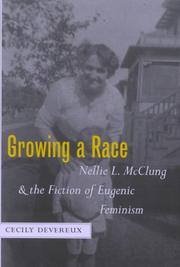
ISBN: 128352998X 9786613842435 0773573046 9780773573048 0773529373 9780773529373 6613842435 Year: 2005 Publisher: Montreal [Que.] McGill-Queen's University Press
Abstract | Keywords | Export | Availability | Bookmark
 Loading...
Loading...Choose an application
- Reference Manager
- EndNote
- RefWorks (Direct export to RefWorks)
Cecily Devereux reconsiders the extent to which McClung's enduring legacy of crusading for women's rights is founded on the ideas of British eugenicists such as Francis Galton and Caleb Saleeby and implicated in the passage of eugenical legislation in Canada. In a critical study of Painted Fires, the Pearlie Watson books, and several short stories, Devereux attempts to understand McClung's fiction in terms of its engagement with a politics of "race" and nation and constructions of specifically "racial" impurities that many women saw themselves as uniquely able to "cure."
Eugenics in literature. --- Feminism in literature. --- British --- British people --- Britishers --- Britons (British) --- Brits --- Ethnology --- Feminist theory in literature --- Social aspects. --- McClung, Nellie L., --- McClung, Nellie Letitia Mooney, --- Mooney, Nellie Letitia,
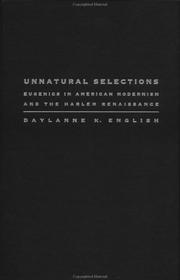
ISBN: 0807863521 9780807863527 0807828688 9780807828687 0807855316 9780807855317 9798890877758 Year: 2004 Publisher: Chapel Hill University of North Carolina Press
Abstract | Keywords | Export | Availability | Bookmark
 Loading...
Loading...Choose an application
- Reference Manager
- EndNote
- RefWorks (Direct export to RefWorks)
In challenging conventional constructions of the Harlem Renaissance and American modernism, Daylanne English argues that in the 1920's, the form and content of writings by figures as disparate as W. E. B. Du Bois, T. S. Eliot, Gertrude Stein, and Nella Larsen were shaped by anxieties regarding immigration and intraracial breeding.
American literature --- Eugenics in literature. --- African Americans --- Modernism (Literature) --- African Americans in literature. --- Harlem Renaissance. --- Race in literature. --- Afro-Americans in literature --- Negroes in literature --- English literature --- Agrarians (Group of writers) --- New Negro Movement --- Renaissance, Harlem --- African American arts --- History and criticism. --- African American authors --- White authors --- Intellectual life --- 20th century --- History and criticism --- Eugenics in literature --- United States --- African Americans in literature --- Race in literature --- Du Bois, William Edward Burghardt --- Eliot, Thomas Stearns --- Stein, Gertrude
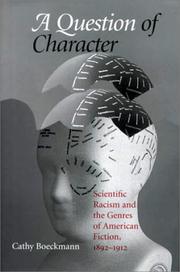
ISBN: 058536026X 9780585360263 0817310215 Year: 2000 Publisher: Tuscaloosa University of Alabama Press
Abstract | Keywords | Export | Availability | Bookmark
 Loading...
Loading...Choose an application
- Reference Manager
- EndNote
- RefWorks (Direct export to RefWorks)
"In A Question of Character, Cathy Boeckmann establishes a strong link between racial questions and the development of literary traditions at the end of the 19th century in America. This period saw the rise of "scientific racism," which claimed that the races were distinguished not solely by exterior appearance but also by a set of inherited character traits. As Boeckmann explains, this emphasis on character meant that race was not only a thematic concern in the literature of the period but also a generic or formal one as well." "Boeckmann explores the intersections between race and literary history by tracing the language of character through both scientific and literary writing."--Jacket.
American fiction --- Racism in literature. --- Literature and science --- Characters and characteristics in literature. --- Race discrimination in literature. --- Passing (Identity) in literature. --- African Americans in literature. --- Eugenics in literature. --- Literary form. --- Racially mixed people in literature. --- Literary form --- Eugenics in literature --- Racism in literature --- Characters and characteristics in literature --- Racially mixed people in literature --- Race discrimination in literature --- Passing (Identity) in literature --- African Americans in literature --- American Literature --- English --- Languages & Literatures --- Afro-Americans in literature --- Negroes in literature --- Mulattoes in literature --- Character sketches --- Characterization (Literature) --- Literary characters --- Literary portraits --- Portraits, Literary --- Poetry and science --- Science and literature --- Science and poetry --- Science and the humanities --- American literature --- Form, Literary --- Forms, Literary --- Forms of literature --- Genre (Literature) --- Genre, Literary --- Genres, Literary --- Genres of literature --- Literary forms --- Literary genetics --- Literary genres --- Literary types (Genres) --- Literature --- History and criticism. --- History. --- History --- History and criticism --- Multiracial peoplein literature. --- Multiracial people in literature.
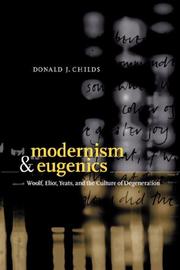
ISBN: 1107123933 0521033306 0511119704 0511485026 0511153775 0511303556 0511044070 128015490X 0511017855 9780511017858 9780511044076 9780511119705 9780521806015 0521806011 9780511485022 9781107123939 9780521033305 9780511153778 9780511303555 Year: 2001 Publisher: Cambridge, UK ; New York, NY : Cambridge University Press,
Abstract | Keywords | Export | Availability | Bookmark
 Loading...
Loading...Choose an application
- Reference Manager
- EndNote
- RefWorks (Direct export to RefWorks)
In Modernism and Eugenics, first published in 2001, Donald Childs shows how Virginia Woolf, T. S. Eliot and W. B. Yeats believed in eugenics, the science of race improvement and adapted this scientific discourse to the language and purposes of the modern imagination. Childs traces the impact of the eugenics movement on such modernist works as Mrs Dalloway, A Room of One's Own, The Waste Land and Yeats's late poetry and early plays. The language of eugenics moves, he claims, between public discourse and personal perspectives. It informs Woolf's theorization of woman's imagination; in Eliot's poetry, it pictures as a nightmare the myriad contemporary eugenical threats to humankind's biological and cultural future. And for Yeats, it becomes integral to his engagement with the occult and his commitment to Irish Nationalism. This is an interesting study of a controversial theme which reveals the centrality of eugenics in the life and work of several major modernist writers.
English literature --- Modernism (Literature) --- Degeneration in literature. --- Eugenics in literature. --- Race in literature. --- History and criticism. --- Woolf, Virginia, --- Eliot, T. S. --- Yeats, W. B. --- Yeats, William Butler --- D. E. D. I., --- Daemon Est Deus Inversus, --- Ganconagh, --- I., D. E. D., --- Йейтс, У. Б. --- Ĭeĭts, U. B. --- Йейтс, Уильям Батлер, --- Ĭeĭts, Uilʹi︠a︡m Batler, --- Weilian Batele Yezhi, --- Yeṭs, Ṿilyam Baṭler, --- יטס, יטלאם בטלר --- ייטס, ויליאם בטלר, --- 威廉,巴特勒,叶芝, --- Eliot, Thomas Stearns --- Woolf, Virginia Stephen, --- Stephen, Virginia, --- Ulf, Virzhinii︠a︡, --- Ṿolf, Ṿirg'inyah, --- Vulf, Virdzhinii︠a︡, --- Вулф, Вирджиния, --- וולף, וירג׳יניה --- וולף, וירג׳יניה, --- Stephen, Adeline Virginia, --- Views on race. --- Degeneration in literature --- Eugenics in literature --- Race in literature --- 820 "19" --- 820 "19" Engelse literatuur--20e eeuw. Periode 1900-1999 --- Engelse literatuur--20e eeuw. Periode 1900-1999 --- History and criticism --- Criticism and interpretation. --- Woolf, Virginia --- Arts and Humanities --- Literature --- Ai-lüeh-tʻe, --- Īliyūt, T. S., --- Elliŏtʻŭ, --- Eliot, Thōmas S., --- Eliot, Th. S., --- Eliot, Thomas Stern, --- Elyoṭ, T. S., --- Ėliot, Tomas Stirns, --- אליוט ט.ס --- אליוט, ת. ס.
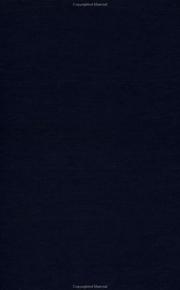
ISBN: 0203616871 1299484328 1136065547 9781136065545 9780203616871 9780203616871 0415937388 9780415937382 9781136065705 1136065709 9781136065620 1136065628 9780415860994 0415860997 Year: 2002 Publisher: New York Routledge
Abstract | Keywords | Export | Availability | Bookmark
 Loading...
Loading...Choose an application
- Reference Manager
- EndNote
- RefWorks (Direct export to RefWorks)
Eugenic Fantasies is an innovative work that combines interpretive strategies from the fields of psychoanalysis, anthropology, and literary studies to create a new model for theorizing race.
American literature --- Race in literature. --- Literature and science --- Popular culture --- Eugenics --- Racism --- Eugenics in literature. --- Homiculture --- Race improvement --- Euthenics --- Heredity --- Involuntary sterilization --- History and criticism. --- History --- Fitzgerald, F. Scott --- H. D. --- Hemingway, Ernest, --- Hemingway, Ernest --- Kheminguėĭ, Ėrnest --- Hai-ming-wei, --- Hemingvej, Ernest --- Hemingwei --- Hīminjwāy, Arnist --- Ḣeminguei̐, E. --- Ḣeminguei̐, Ernest --- Heminguej, Ernest --- Heminguej, E. --- Hemingṿey, Ernesṭ --- Haminghwāy, Arnist --- Hayminghwāy, Arnis, --- Himinghwāy, Arnist --- Himinghwāy, --- Hemingvejs, Ernests --- Hemingṿe, Ernesṭ --- Chemingouaiē, Ernest --- Heminguwei, Ānesuto --- Haimingwei, Eneisite --- Haimingwei, Ouneisite --- Haimingwei, Ennasite --- Hemingwei, Ŏnesŭtʻŭ --- Хемингуэй, Эрнест --- Хемингуэй, Э. М. --- המינגווי, ארנסט --- המינגווי, ארנסט, --- המינגוי, ארנסט --- המינגוי, ארנסט, --- העמינגוועי, ערנעסט --- 海明威, --- E. ヘミングウェイ, --- همنغواي، ارنست --- همينگوى، ارنست --- ヘミングウェイ, アーネスト, --- 헤밍웨이, 어네스트, --- 海明威, 欧内斯特, --- Chaiminkouaiē, Ernest --- Helforth, John, --- Doolittle, Hilda, --- D., H. --- HD --- Alton, Delia, --- Fitzgerald, Francis Scott Key --- Fitzgerald, Francis Scott Key --- Criticism and interpretation.
| Listing 1 - 5 of 5 |
Sort by
|

 Search
Search Feedback
Feedback About UniCat
About UniCat  Help
Help News
News